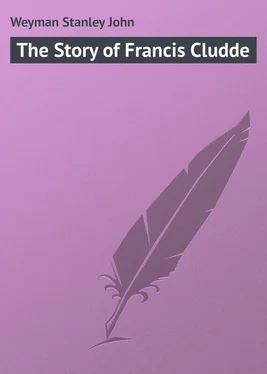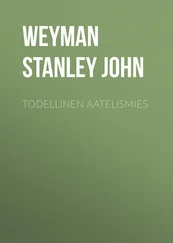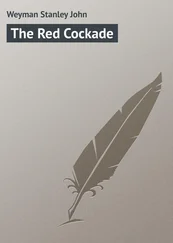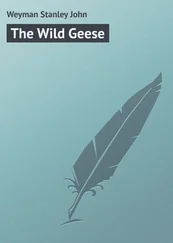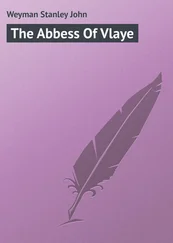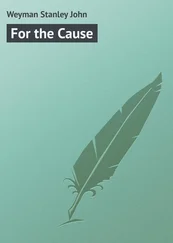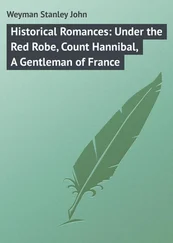Stanley Weyman - The Story of Francis Cludde
Здесь есть возможность читать онлайн «Stanley Weyman - The Story of Francis Cludde» — ознакомительный отрывок электронной книги совершенно бесплатно, а после прочтения отрывка купить полную версию. В некоторых случаях можно слушать аудио, скачать через торрент в формате fb2 и присутствует краткое содержание. Жанр: foreign_prose, foreign_language, на английском языке. Описание произведения, (предисловие) а так же отзывы посетителей доступны на портале библиотеки ЛибКат.
- Название:The Story of Francis Cludde
- Автор:
- Жанр:
- Год:неизвестен
- ISBN:нет данных
- Рейтинг книги:3 / 5. Голосов: 1
-
Избранное:Добавить в избранное
- Отзывы:
-
Ваша оценка:
- 60
- 1
- 2
- 3
- 4
- 5
The Story of Francis Cludde: краткое содержание, описание и аннотация
Предлагаем к чтению аннотацию, описание, краткое содержание или предисловие (зависит от того, что написал сам автор книги «The Story of Francis Cludde»). Если вы не нашли необходимую информацию о книге — напишите в комментариях, мы постараемся отыскать её.
The Story of Francis Cludde — читать онлайн ознакомительный отрывок
Ниже представлен текст книги, разбитый по страницам. Система сохранения места последней прочитанной страницы, позволяет с удобством читать онлайн бесплатно книгу «The Story of Francis Cludde», без необходимости каждый раз заново искать на чём Вы остановились. Поставьте закладку, и сможете в любой момент перейти на страницу, на которой закончили чтение.
Интервал:
Закладка:
"Go! go!" I cried impatiently. Each second I expected the court to be invaded, for the man had screamed more than once.
But they hesitated. I had been forced to hurt him a little, and he was moaning piteously. "Who are you?" the elder woman asked-she who had spoken all through.
"Nay, never mind that!" I answered. "Do you go! Go, while you can. You know the way to the Wharf."
"Yes," she answered. "But I cannot go and leave him at your mercy. Remember he is a man, and has-"
"He is a treacherous scoundrel," I answered, giving his throat a squeeze. "But he shall have one more chance. Listen, sirrah!" I continued to the man, "and stop that noise or I will knock out your teeth with my dagger-hilt. Listen and be silent. I shall go with these ladies, and I promise you this: If they are stopped or hindered on their way, or if evil happen to them at that wharf, whose name you had better forget, it will be the worse for you. Do you hear? You will suffer for it, though there be a dozen guards about you! Mind you," I added, "I have nothing to lose myself, for I am desperate already."
He vowed-the poor craven-with his stuttering tongue, that he would be true, and vowed it again and again. But I saw that his eyes did not meet mine. They glanced instead at the knife-blade, and I knew, even while I pretended to trust him, that he would betray us. My real hope lay in his fears, and in this, that as the fugitives knew the way to the wharf, and it could not now be far distant, we might reach it, and go on board some vessel-I had gathered they were flying the country-before this wretch could recover himself and get together a force to stop us. That was my real hope, and in that hope only I left him.
We went as fast as the women could walk. I did not trouble them with questions; indeed, I had myself no more leisure than enabled me to notice their general appearance, which was that of comfortable tradesmen's womenfolk. Their cloaks and hoods were plainly fashioned, and of coarse stuff, their shoes were thick, and no jewel or scrap of lace, peeping out, betrayed them. Yet there was something in their carriage which could not be hidden, something which, to my eye, told tales; so that minute by minute I became more sure that this was really an adventure worth pursuing, and that London had kept a reward in store for me besides its cold stones and inhospitable streets.
The city was beginning to rouse itself. As we flitted through the lanes and alleys which lie between Cheapside and the river, we met many people, chiefly of the lower classes, on their way to work. Yet in spite of this, we had no need to fear observation, for, though the morning was fully come, with the light had arrived such a thick, choking, yellow fog as I, being for the most part country-bred, had never experienced. It was so dense and blinding that we had a difficulty in keeping together, and even hand in hand could scarcely see one another. In my wonder how my companions found their way, I presently failed to notice their condition, and only remarked the distress and exhaustion which one of them was suffering, when she began, notwithstanding all her efforts, to lag behind. Then I sprang forward, blaming myself much. "Forgive me," I said. "You are tired, and no wonder. Let me carry the child, mistress."
Exhausted as she was, she drew away from me jealously.
"No," she panted. "We are nearly there. I am better now." And she strained the child closer to her, as though she feared I might take it from her by force.
"Well, if you will not trust me," I answered, "let your friend carry it for a time. I can see you are tired out."
Through the mist she bent forward, and peered into my face, her eyes scarcely a foot from mine. The scrutiny seemed to satisfy her. She drew a long breath and held out her burden. "No," she said; "you shall take him. I will trust you."
I took the little wrapped-up thing as gently as I could. "You shall not repent it, if I can help it, Mistress-"
"Bertram," she said.
"Mistress Bertram," I repeated. "Now let us get on and lose no time."
A walk of a hundred yards or so brought us clear of the houses, and revealed before us, in place of all else, a yellow curtain of fog. Below this, at our feet, yet apparently a long way from us, was a strange, pale line of shimmering light, which they told me was the water. At first I could hardly believe this. But, pausing a moment while my companions whispered together, dull creakings and groanings and uncouth shouts and cries, and at last the regular beat of oars, came to my ears out of the bank of vapor, and convinced me that we really had the river before us.
Mistress Bertram turned to me abruptly. "Listen," she said, "and decide for yourself, my friend. We are close to the wharf now, and in a few minutes shall know our fate. It is possible that we may be intercepted at this point, and if that happen, it will be bad for me and worse for any one aiding me. You have done us gallant service, but you are young; and I am loath to drag you into perils which do not belong to you. Take my advice, then, and leave us now. I would I could reward you," she added hastily, "but that knave has my purse."
I put the child gently back into her arms. "Good-by," she said, with more feeling. "We thank you. Some day I may return to England, and have ample power-"
"Not so fast," I answered stiffly. "Did you think it possible, mistress, that I would desert you now? I gave you back the child only because it might hamper me, and will be safer with you. Come, let us on at once to the wharf."
"You mean it?" she said.
"Of a certainty!" I answered, settling my cap on my head with perhaps a boyish touch of the braggart.
At any rate, she did not take me at once at my word; and her thought for me touched me the more because I judged her-I know not exactly why-to be a woman not over prone to think of others. "Do not be reckless," she said slowly, her eyes intently fixed on mine. "I should be sorry to bring evil upon you. You are but a boy."
"And yet," I answered, smiling, "there is as good as a price upon my head already. I should be reckless if I stayed here. If you will take me with you, let us go. We have loitered too long already."
She turned then, asking no questions; but she looked at me from time to time in a puzzled way, as though she thought she ought to know me-as though I reminded her of some one. Paying little heed to this then, I hurried her and her companion down to the water, traversing a stretch of foreshore strewn with piles of wood and stacks of barrels and old rotting boats, between which the mud lay deep. Fortunately it was high tide, and so we had not far to go. In a minute or two I distinguished the hull of a ship looming large through the fog; and a few more steps placed us safely on a floating raft, on the far side of which the vessel lay moored.
There was only one man to be seen lounging on the raft, and the neighborhood was quiet. My spirits rose as I looked round. "Is this the Whelp? " the tall lady asked. I had not heard the other open her mouth since the encounter in the court.
"Yes, it is the Whelp , madam," the man answered, saluting her and speaking formally, and with a foreign accent. "You are the lady who is expected?"
"I am," she answered, with authority. "Will you tell the captain that I desire to sail immediately, without a moment's delay? Do you understand?"
"Well, the tide is going out," quoth the sailor, dubiously, looking steadily into the fog, which hid the river. "It has just turned, it is true. But as to sailing-"
She cut him short. "Go, go! man. Tell your captain what I say. And let down a ladder for us to get on board."
He caught a rope which hung over the side, and, swinging himself up, disappeared. We stood below, listening to the weird sounds which came off the water, the creaking and flapping of masts and canvas, the whir of wings and shrieks of unseen gulls, the distant hail of boatmen. A bell in the city solemnly tolled eight. The younger woman shivered. The elder's foot tapped impatiently on the planks. Shut in by the yellow walls of fog, I experienced a strange sense of solitude; it was as if we three were alone in the world-we three who had come together so strangely.
Читать дальшеИнтервал:
Закладка:
Похожие книги на «The Story of Francis Cludde»
Представляем Вашему вниманию похожие книги на «The Story of Francis Cludde» списком для выбора. Мы отобрали схожую по названию и смыслу литературу в надежде предоставить читателям больше вариантов отыскать новые, интересные, ещё непрочитанные произведения.
Обсуждение, отзывы о книге «The Story of Francis Cludde» и просто собственные мнения читателей. Оставьте ваши комментарии, напишите, что Вы думаете о произведении, его смысле или главных героях. Укажите что конкретно понравилось, а что нет, и почему Вы так считаете.
